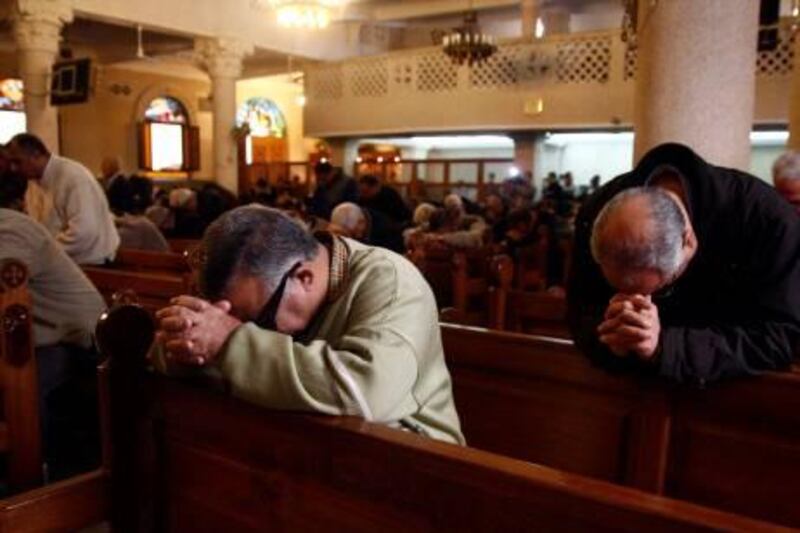CAIRO // Christians returned to pray and to mourn yesterday at a church attacked 24 hours earlier by a suspected suicide bomber who killed 21 people.
Bloodstains from Saturday's attack were still visible on the facade of Al Qiddissin Coptic church in the Mediterranean port city of Alexandria. Inside, dozens of grieving worshippers chanted the liturgy of the Christian denomination that traces its roots in Egypt back nearly 2,000 years.
At the Vatican, Pope Benedict XVI said the attack "offends God and all of humanity". In Baghdad, where a Coptic Christian church suffered a similar bombing in October, the prime minister Nouri al Maliki said the assault "demonstrates again the criminal nature of terrorists".
Coptic Christians in the UAE also said they were shocked by the attack. "It was a massacre that struck at the hearts of all Egyptians, be they Copts or Muslims, especially as we have all lived side by side for decades," one said.
There was no immediate claim of responsibility for Saturday's attack, but suspicion continued to focus on al Qa'eda or one of its affiliates after the Egyptian president Hosni Mubarak blamed the bombing on "foreign elements".
Egyptian officials said the attack was alien to the country, both in scale and execution. "It is almost the first time we had a suicide bombing," said the cabinet spokesman Magdy Rady. He too said the method and timing of the bombing suggested foreign involvement.
However, Egyptian police said they were focusing their investigation on a group of Islamist extremists in Alexandria inspired by but not directly linked to al Qa'eda. They were also examining the passenger lists of recent flights to Egypt from Iraq.
Security officials said 25 people had been detained for questioning, mostly owners of cars parked outside the church at the time, shopkeepers and neighbours known to have Islamist militant sympathies.
The Islamic State of Iraq, al Qa'eda's branch in Iraq, has said it would attack Christian sites after it claimed Egypt's Coptic church was holding the wives of two priests after the women converted to Islam. The church has denied this charge.
The group says it carried out the attack on Our Lady of Salvation cathedral in central Baghdad in October, in which 44 worshippers, two priests and seven security force personnel died.
Egypt’s interior ministry in recent years has accused alleged militants of involvement with groups linked to al Qa’eda, only to release them or prolong their detention and trial amid claims of torture and threadbare evidence. To the relief of Egyptians who would prefer to avoid the implications of a homegrown group with a purely domestic agenda, the government has also blamed outsiders for the rare attacks on tourist sites.
In the past two years, Egyptian authorities have focused especially on Hamas-controlled Gaza, where they allege militants have received training to conduct attacks in Egypt and Europe.
Hani Aziz, an adviser to the Coptic Pope Shenouda III, echoed the government’s theme yesterday, saying he was certain the attack was carried out with foreign direction. “It was a big criminal act, from the outside. There were the threats, and then this happened,” he said.
Yesterday, however, normally sceptical analysts suggested this picture may now be too simplistic.
“The method, the timing, the expertise, suggest al Qa’eda has fingers in this attack,” said Amr el Shobaky, an expert on Islamist movements with the Ahram Centre for Political and Strategic Studies.
The key question, especially with a presidential election this year, is whether al Qa’eda has established a presence in Egypt, said Diaa Rashwan, another political Islam expert with the centre.
“There is something new happening,” he said. “It could be an al Qa’eda franchise. It has the features of an al Qa’eda attack.”
Copts, who make up about 10 per cent of the country’s 80 million people, complain of systematic discrimination, such as the legal requirement to obtain presidential permission to build churches. Yesterday, a church-affiliated association of Coptic priests in Alexandria described the attack “as a dangerous escalation of the sectarian incidents against Copts”.
“If the government was able to prevent the escalation by Islamist extremists in the past months, this massacre would not have happened. The incitement reached Iraq, and has come back to Egypt,” said Nagib Gibrail, a Coptic lawyer and activist.
* Reporting by Magdy Samaan in Cairo, Essam al Ghalib in Al Ain, the Associated Press and Agence France-Presse





